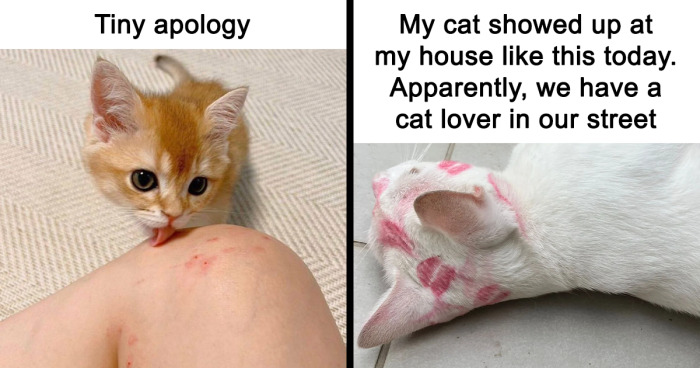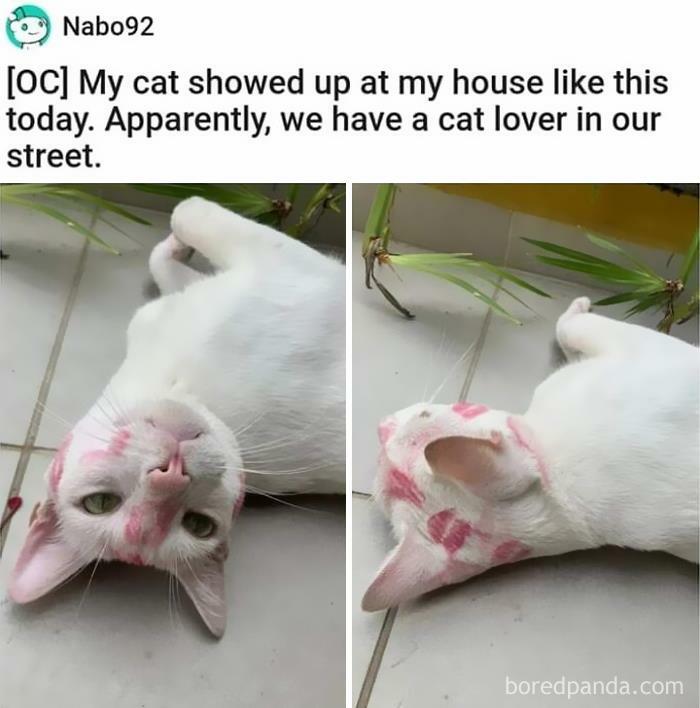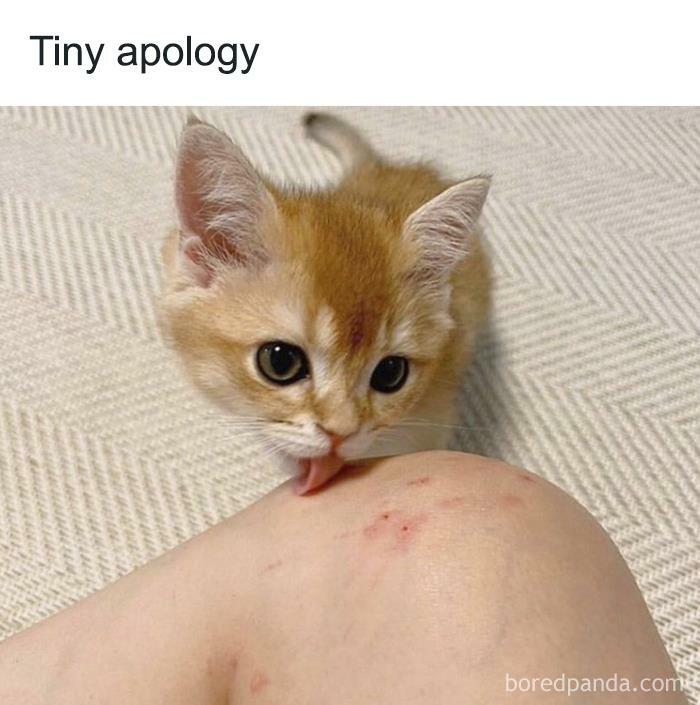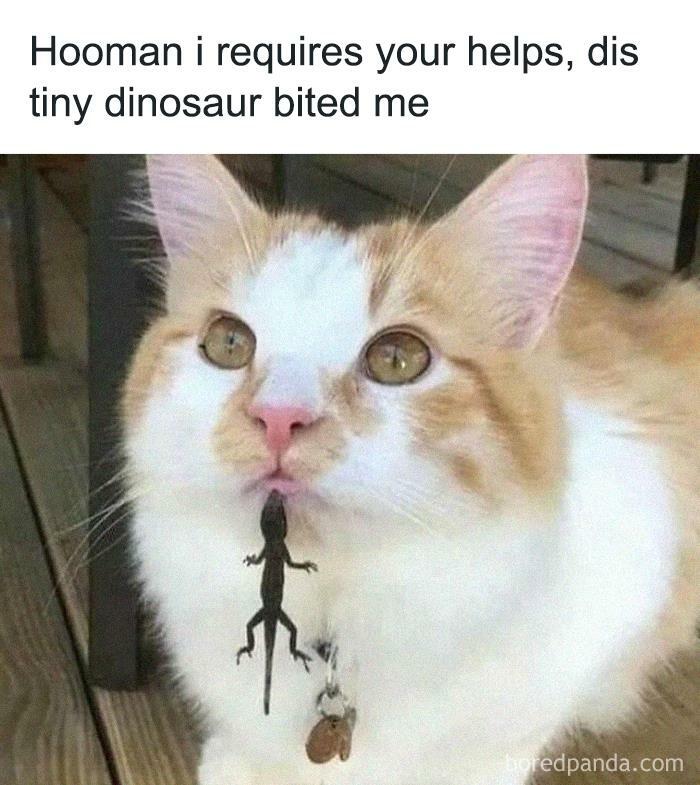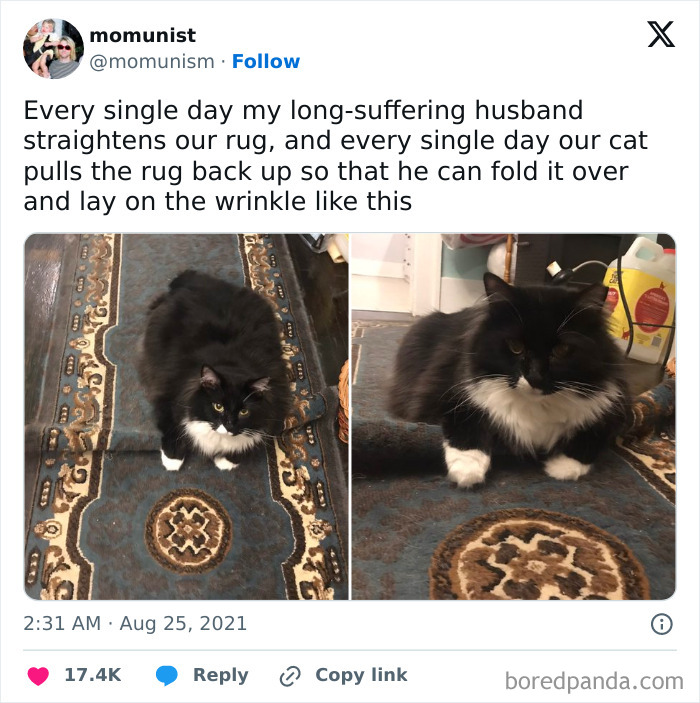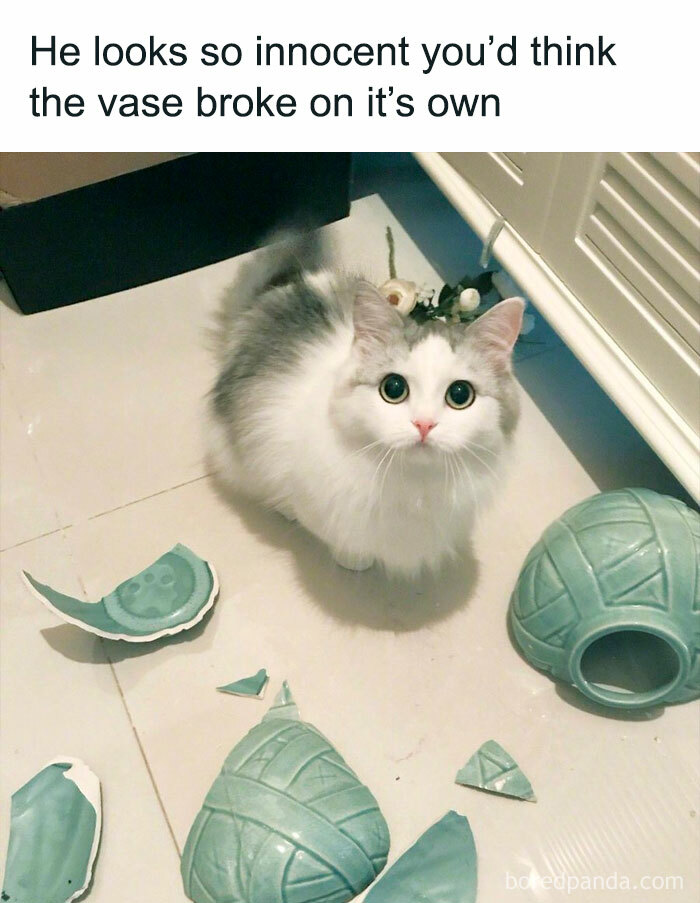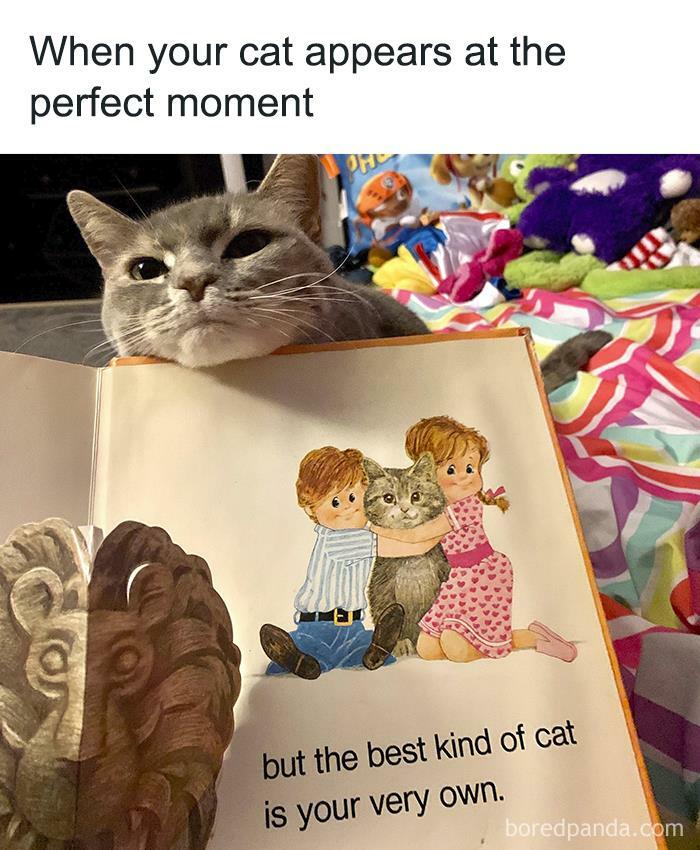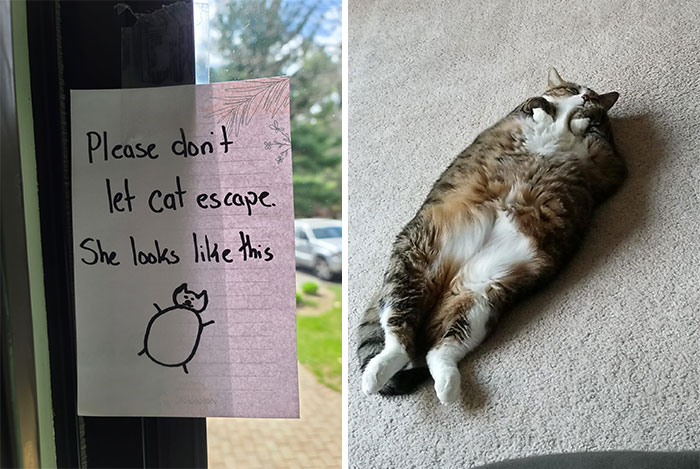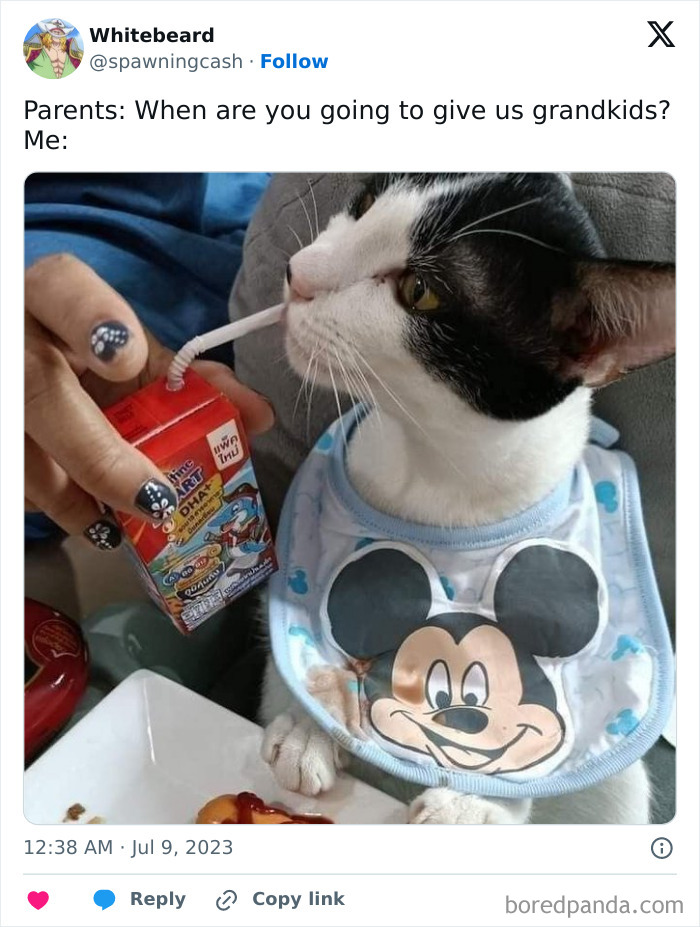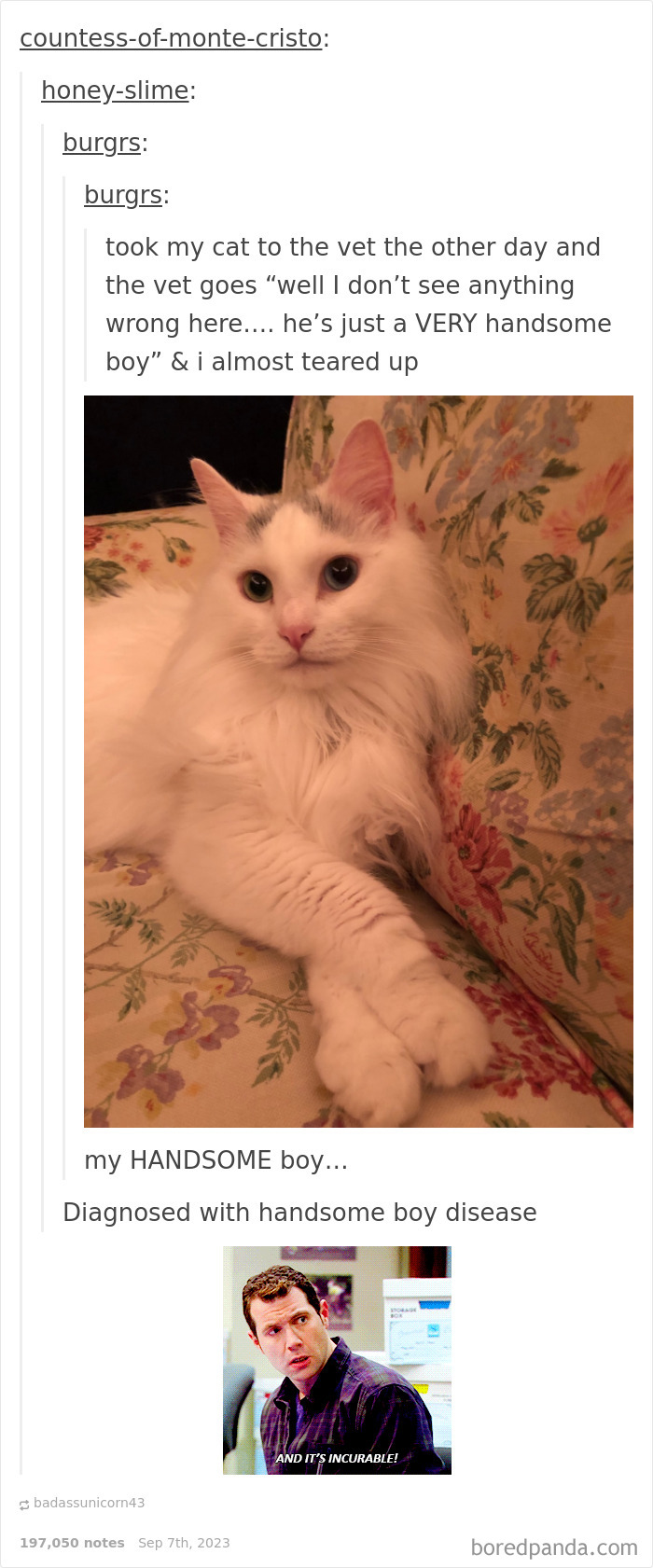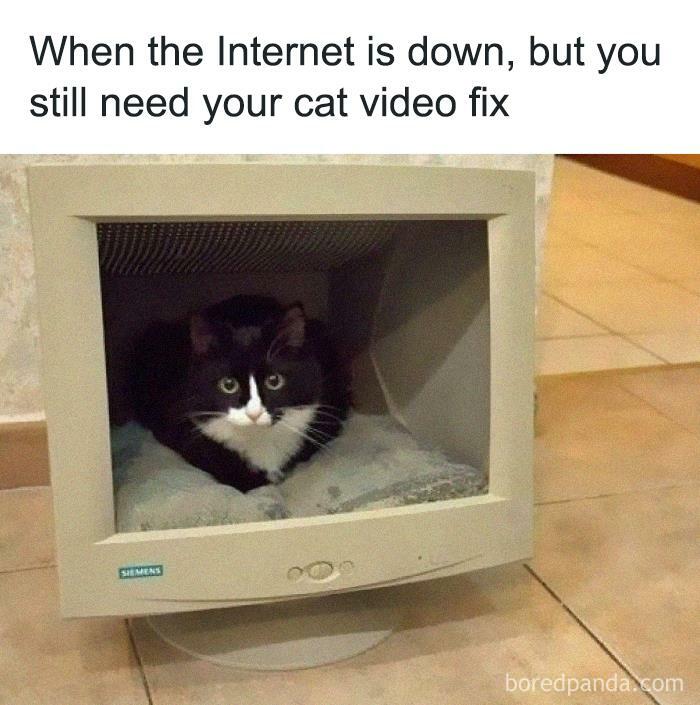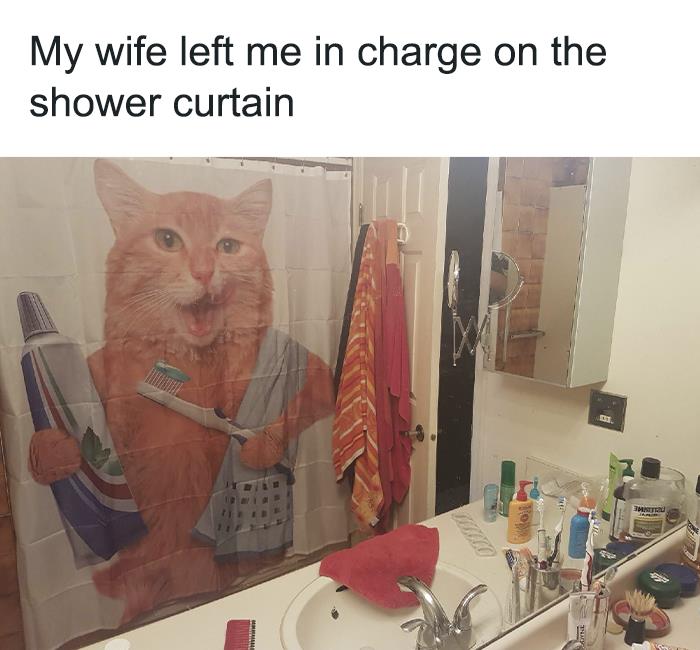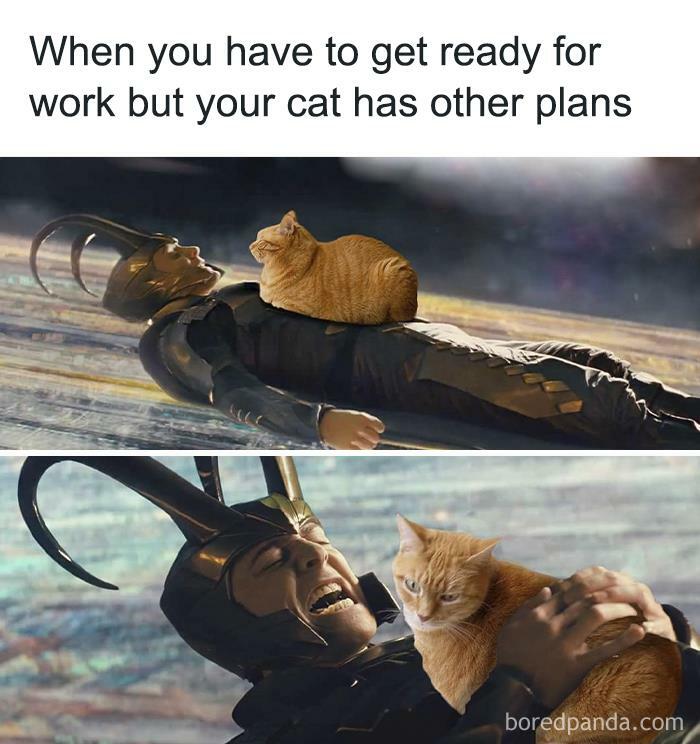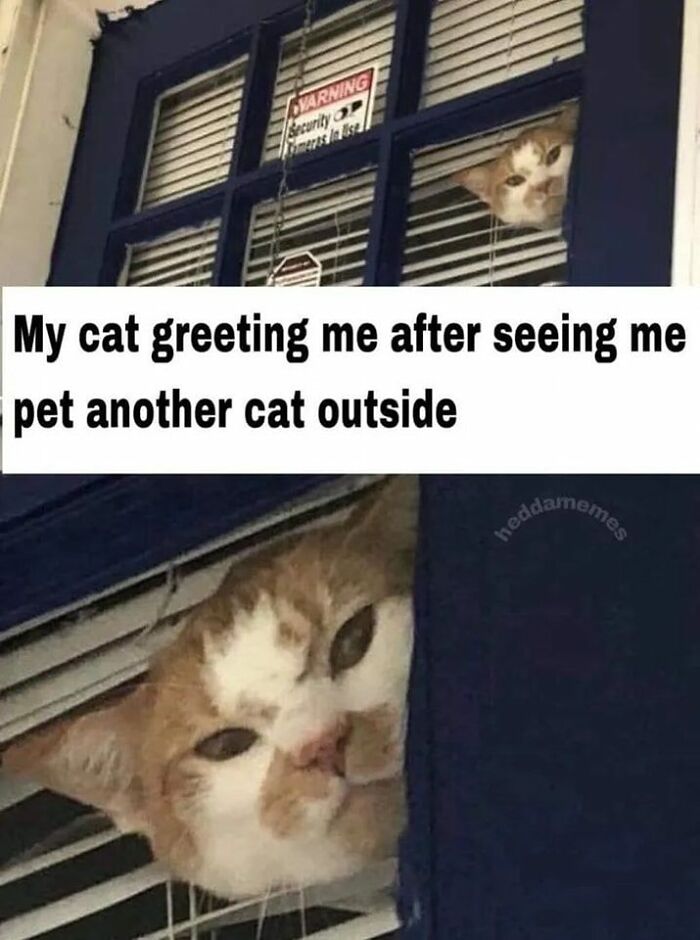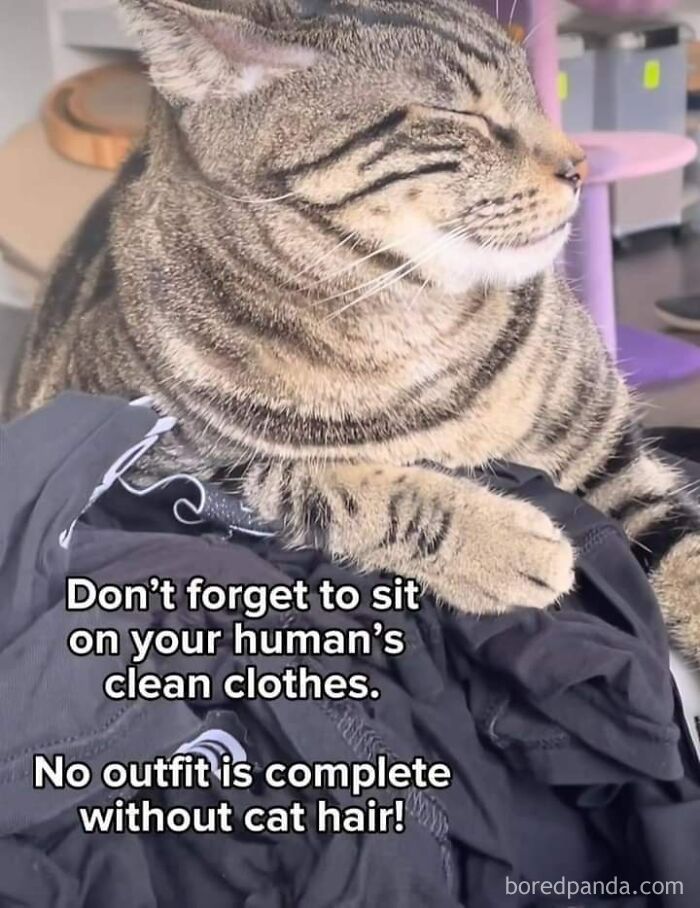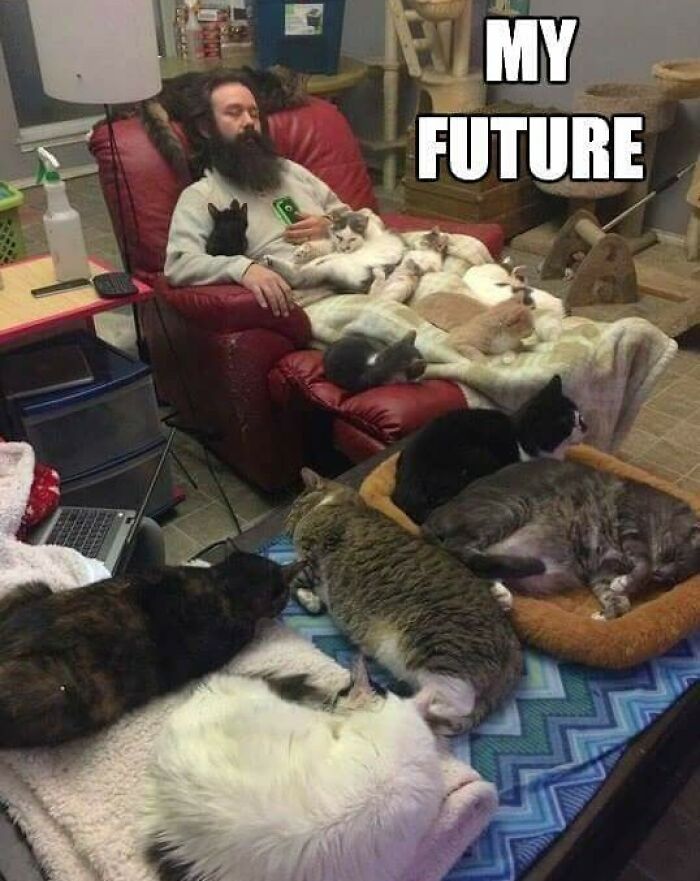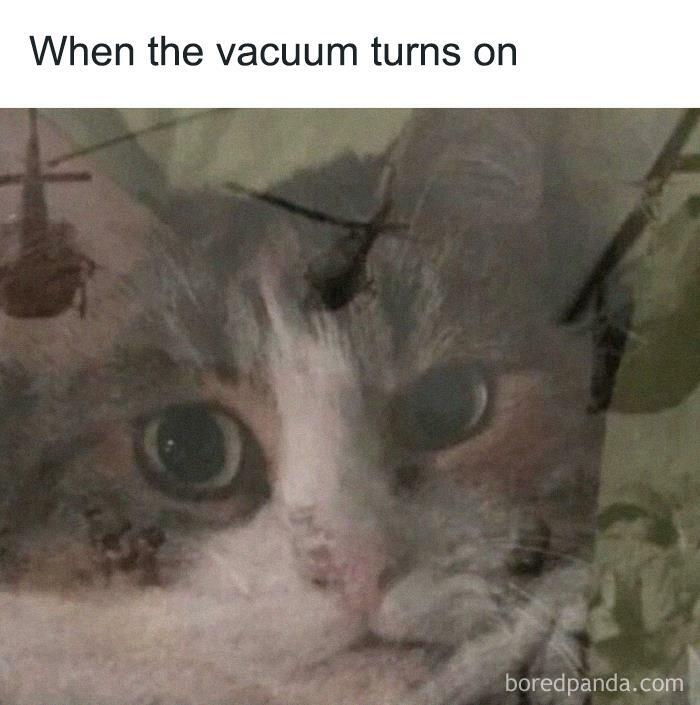It is no secret that cats have taken over the internet, and literally, no one is mad about that. From photos to videos, we just can't resist good cat content. Therefore today, we're excited to share a compilation of the funniest cat memes from the Facebook page “Memes for my cat” which has collected over 196K followers, and still counting. These goofy, relatable, and sometimes chaotic memes perfectly depict what having a cat is like. So, if you are a proud owner yourself, don’t forget to include your beloved pet and share the memes with them as well.
However, beyond laughs and quirky content, there is always a more serious side of cats that we, on Bored Panda, are committed to shedding light on when given the opportunity: the world of cat adoption. To address this subject, we got an exclusive interview with the founder and president of All Cats All the Time, Inc., an organization dedicated to promoting cat adoption and preventing the surrender and abandonment of cats.
So, without further ado, we invite you to scroll down for some funny cat memes, as well as delve into an insightful and in-depth interview with feline expert Rachel Geller.
More info: drrachelcatbehavior.com | Instagram | Facebook | twitter.com
This post may include affiliate links.
Rachel Geller is certified as a cat behavior and retention specialist, humane education specialist, Pet Chaplain®, fear-free shelter specialist, American Association of Feline Practitioners cat-friendly veterinary advocate, and RedRover reader. Due to her extensive experience promoting cat adoption, we asked Rachel to share some compelling reasons why individuals should consider adopting a cat instead of buying one from a breeder or pet store.
“Most importantly, the cat knows. Adopted cats are grateful. People who don't know and love cats the way I do may not 'get' this but adopted cats tend to be more loving and affectionate than ones bought from a breeder. Many people who have bought cats from breeders, but also adopted cats from shelters report anecdotally that the ‘rescued’ cat acts more affectionately towards them. This could be because cats are very perceptive, loyal creatures and have a ‘sixth sense’ and they understand that you saved them. The cat realizes she has hit the jackpot and knows that her life is much better now than it was in the shelter. I have personally rescued abused and abandoned cats from shelters and watched them turn into the most affectionate cats once they were in my home. The goal of a kitten mill is profit and to produce as many kittens as possible. The adult female and male unspayed/unneutered cats who will be the parents of these kittens are kept in cages with their sole purpose being to breed new cats. They are kept in terrible conditions and so are their newborns. Many of the kittens produced at these mills will have hidden medical problems that don’t become apparent until later in their lives. By then, it may be too late to save them and treatment could be expensive. Few people are aware of these places and their practices and they don’t know that by buying a kitten from a pet store, they are unwittingly supporting this cruel industry. When you adopt a cat you're giving a cat a second chance at life.
Adopting a cat, versus purchasing one from a pet store or a breeder, allows for an additional opening at an animal shelter for another cat to be adopted, thus saving 2 lives. By adopting, you are giving a cat a safe and loving home in which she can learn to be a happy and healthy cat again. Purebred cats tend to be more predisposed to health issues. Mixed-breed cats tend to have less inherited genetic health problems. By choosing a cat that is in good health, but that may have a mixed lineage, you will have a cat with fewer medical problems in her lifetime. Animal shelters take excellent care of their cats due to both the dedication and passion of their employees and volunteers and also because of the many strict regulations around shelters. Some cats may have been abused and neglected before arriving at a shelter, but once there they are given needed medical attention, vaccinations, medicine, care, behavioral screenings, and lots of attention by professional staff members and volunteers; When a shelter cat has put up for adoption, she is ready to join her new family,” shared Rachel.
Rachel is very passionate about cats and that shows not only in her words but most importantly, her actions and work. Rachel’s organization focuses on preventing the surrender and abandonment of cats. We asked her to explain how adopting a cat can contribute to this important mission, and what benefits it offers to both the cat and the owner.
“I founded All Cats All the Time, Inc. so that I could broaden my mission of keeping adopted cats and people together with my free cat behavior counseling and providing cat-related financial assistance. My mission is to ensure there is never a financial barrier preventing people from keeping their cats in their homes when the issue is a behavior problem, but sometimes to solve a cat behavior problem, you need other things besides guidance or a program to follow. For low-income people who want to keep their cats, this can be a terrible hardship. Examples of cat-related items that may be necessary to solve a problem but can be expensive are a scratching post, litter boxes, medical tests, or prescription food. On a yearly basis, I have been able to keep between 900-1,000 cats in their homes completely free of charge... This saves two lives because then an open spot in the shelter can be available for a cat who is truly homeless. This benefits the cats and the people. Shelters are already overcrowded and thousands of cats are euthanized every year. Most people consider their cat part of the family and do not want to give up their beloved cats. It is heartbreaking. By reducing the intake of cats who are being surrendered due to cat behavior problems, we can focus on the cats who are truly homeless and need shelter and rescue. This benefits everyone. Shelters have a limited amount of space and resources and are forced to make the tough decision to euthanize an unwanted cat. If we adopt cats, we can reduce the number of cats who are euthanized and give them a warm and loving home instead. And with cats being great therapy and emotional support animals, a major benefit is easing our stress, helping with mental health and anxiety, and providing companionship,” explained Rachel.
Given Rachel’s certifications as a cat behavior and retention specialist, she has a deep understanding of feline behavior. We were wondering how adopting a cat, especially one from a shelter or rescue, impacts their behavior and adaptability in a new home.
“Your cat will be fearful at first. She is going to want to establish her territory. Set things up so that your adopted shelter cat can feel safe and secure in her new territory. Remember, she has been through many changes and will need to cope with these changes in her environment. She will need some time and patience. You always want to start your new cat off in her own room, preferably a small one, because too much new territory too soon will be overwhelming to your cat. I like to call it a sanctuary room. The most important thing is to go at the cat's pace.
Once you’ve selected your sanctuary room, you’ll want to make sure the space is cat-proofed and ready for your new arrival. Make sure there are no hiding places in the room. If there is a bed, bureau, or other furniture in the room that a cat could hide under, put luggage, boxes, or storage containers underneath. You don’t want your new cat to spend her days hiding from you. Your cat will want to hide as a way to cope with all of the changes in her life. Block off under the bed and bureau but give her places to hide that are accessible to you, such as a cat tunnel or even a box on its side.
Make sure there are no little cracks or holes in the walls. Cats have moveable collar bones, so if a cat can get her head into a space, she can get her entire body in there.
Make sure there is food and water on one side, and a scratching post and litter box on the other side. Cats love the warmth of the sun and/or a radiator, so place a cat bed in an area where there is a 'sun puddle' or a few feet away from a radiator. Place the toys on the floor away from the walls so the cat can easily engage with and move the toy. On that special day that you bring home your new cat, go directly to the room you have set up as the sanctuary room. Close the door gently behind you and place the carrier on the floor. Open the carrier door, but don't force the cat out. Don’t reach in and pull her out. Let the cat come out at her own pace. You can take the door off the carrier, or tie the door back with a pipe cleaner or baggie tie. This way, your new cat still has the safety and security of her carrier for as long as she needs it. In the beginning, this is the only place that has her familiar scents in it.
Visit your new cat often, but also give her time to settle in on her own. The separation period for your new cat shouldn’t be seen as a punishment like a 'time out' or a jail sentence. Visitation is good and encouraged! Don't be sad about keeping your new cat in a separate room. I know as humans, we wouldn’t love being in a small room all day, but cats find safety and security in small spaces. Cats prefer a small space when it comes to new territory, and you can - and should - go into her sanctuary room as much as you want. Remember that the purpose of the sanctuary room is to let your cat calm down and feel a sense of security in her new home in a manageable fashion.”
Rachel continued: “Spray a synthetic pheromone product in the sanctuary room and also on the door frames. Cats deposit their own pheromones on objects as a signal that this is a friendly, feel-good place. Synthetic pheromones will trick the cat into thinking she has already designated her sanctuary room as her own territory.
Anytime she is in her safe spot, a good thing to do would be to just sit next to her on the floor and read, do work, or talk on the phone. Find that spot where your new cat will accept you, and be near her as often as possible. Sit on the floor and do your own thing - call some friends, or relatives, update your Facebook, work on your laptop - you get the idea. A good rule is to have something in your hands and be looking at that item in your hands. Don't make any overtures toward her so that - from her point of view - you come off as non-threatening. She will eventually feel that it is safe to come closer and investigate you. It helps to get down to the cat’s level when interacting with her instead of towering over her, so try to sit on the floor as much as possible. If you can't sit on the floor, maybe use a pillow or a low chair.
Be sure to hang out with her as much as possible, but don't reach for her or make the first move. Follow her lead. Let the cat set the pace of the interaction. In these matters, it is always best to go at the cat's pace. Be calm, encouraging, and supportive with your voice. The cat will understand.
Let your new cat go at her own pace. Casually greet her with your voice when you enter the sanctuary room. When she does venture closer, maybe sniff at your fingers or your shoes, just act as if this isn’t front-page news. Keep it light, like it's no big deal. Let her do the investigation at her own pace. It may take several sessions of you sitting near her, playing with her, offering treats, but let your new cat set the pace of the progress.
Your new adopted shelter cat has to adjust and cope with all of the changes in her life. Just like people, each cat enters into a new relationship at her own pace. Try tempting her toward you with a tasty treat or fun toy, she just might forget her fear. Feather toys or string toys attached to poles are great devices to coax her into coming closer to you.
Lavish love and attention to your cat with your voice. Tell her how much you love her. Keep earning her trust with daily care, playtime, and routine.”
“You want to keep your adopted shelter cat in the sanctuary room until she seems comfortable and unafraid. Depending on your cat, this could be several days to a couple of weeks. Let your cat set the pace. If she is hiding, then she is not ready to come out to the rest of the house yet. If she is greeting you at the door when you come in, following you when you leave or even trying to get out of the room, those are signs that she is getting ready to explore the territory on the other side of the door. Let your new cat learn to feel confident in her new territory first, and this will also help her to bond with you.
When you do think your adopted shelter cat is ready to see the rest of the home, do it in incremental stages. Don't force your new cat to try to establish her territory in your entire house all at once. This will be way too scary and overwhelming for her. Before you open the door to the sanctuary room, close the doors to some of your other rooms. You can shut bedroom doors, and if you have more than one floor, you can use a tall baby gate or garden lattice so that you can have your new cat start off with one level of the home first,” Rachel explained in detail.
As someone who works with shelters globally and provides individual cat behavior help, Rachel offers some valuable insights to those contemplating their first cat adoption.
“My best advice is to prepare ahead of time. This starts with gathering your supplies. Before you bring your new cat home, there are a few things you’ll need to ensure a happy homecoming. First off, you’ll need to get some cat essentials so your new friend has everything they need as soon as they enter the home.
Provide your new cat with interactive activity toys. Interactive toys such as puzzle feeders are really important for solo play when you are not in the room with her so that she is busy and focused on figuring out fun and engaging challenges. A puzzle feeder is a type of toy where the cat has to accomplish a task, position the toy in a certain way, or make parts of the toy line up just right in order to get a piece of food doled out. A cat who has opportunities to work in order to accomplish a task or solve a puzzle is a cat who will not be focusing on her own fear and anxiety. Most cats have fear, anxiety, and stress when they are moved to a strange place. For the DIYers or the budget-conscious, a ball or crumpled-up piece of paper in a tissue box is a low-cost option to keep a cat interested.
If the sanctuary room has a bed or other furniture that a cat can get under, block that off by placing luggage, boxes, storage containers, etc. underneath these pieces of furniture. Provide accessible hiding places like a cat tunnel, cat cube, or even a box on its side. While a lot of newly adopted shelter cats will tend to hide under beds or couches, the difference with these types of hiding places is that they allow you to be near your cat in a non-threatening way.”
Rachel continued: “Once you’ve gotten all of these supplies, you’ll want to place them in a small room in your home where your cat can have her own safe, secure space. This space I refer to as a sanctuary room, and it’s a critical part of welcoming a new cat home.
Cats need constant access to clean water. Water should be changed daily. Make sure the water bowl is full to prevent whisker fatigue. In addition, the water bowl should be wide and shallow to prevent whisker fatigue (cats don't like their whiskers rubbing against the side or edge of their bowl and also a more shallow bowl promotes movement, which cats like. For food, this should be primarily a protein source; beef, fish, turkey, or poultry. Taurine, an essential amino acid, is important for a cat’s nutritional needs. Look for a statement that the food is 'Complete and Balanced.'
Stainless steel bowls are the best option. Stainless steel does not affect the taste of the food, is durable, and can keep cats healthy by preventing bacteria. A wide, shallow design will keep your cat’s whiskers above the bowl when they eat or drink.
The litter box should be uncovered. Choose a litter that has a soft, sandy texture that simulates what they would find outside.
For cat beds, cats tend to prefer softer surfaces. They also like to curl up in things and feel secure.
The scratching post should be at least 3 feet tall, rope or sisal-wrapped, with a wide, sturdy base.
Provide your cat with vertical space. This can be a cat tree, window perch, or a cozy fleece on top of a bureau or window sill,” Rachel shared valuable information.
And lastly, Rachel added: “One of the focuses of All Cats All the Time is surrender prevention. Many cat owners do not realize that most cat behavior problems are fixable. They decide to surrender their cat due to many barriers such as being able to afford a cat behaviorist and getting access to help. In these cases, the cat is already in a loving home, so the goal of surrender prevention is to make sure that the cat remains there by working with the owner to resolve the behavior issue free of charge. Surrender prevention provides this important resource to cat owners in the community – and this includes adopters and fosters. Surrender prevention saves two lives – the cat who was going to be surrendered stays in her home, and this frees up a spot in the shelter for a cat who is truly homeless.”
More content like this por favor! 😌 (very satisfied before bed, so... goodnight bp!)
Good morning, how did you sleep? (Or not sleep if you couldn’t)
Load More Replies...More content like this por favor! 😌 (very satisfied before bed, so... goodnight bp!)
Good morning, how did you sleep? (Or not sleep if you couldn’t)
Load More Replies...
 Dark Mode
Dark Mode 

 No fees, cancel anytime
No fees, cancel anytime 


